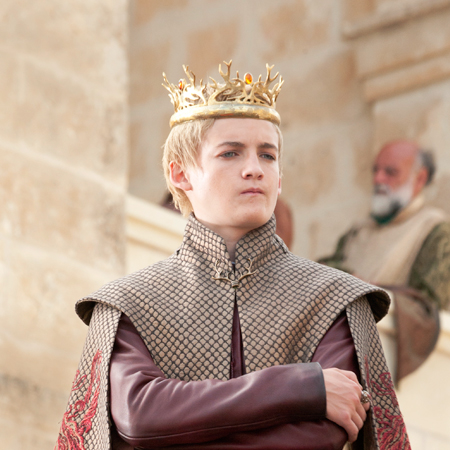
I hate Joffrey Baratheon with the passion of a thousand burning suns.
Not Jack Gleeson, mind you. I think he’s doing an excellent job with the material. From what I understand, he’s a really nice guy. His character, however, really gets on my nerves. He has no regard for authority outside of his own, his bloodthirst verges on the disturbing, he’s spoiled and rotten and just absolutely infuriating.
He’s a wonderful character, though.
I say “wonderful” even as I want to slap the kid around because he does his job beautifully. Villainy such as his can be difficult to take seriously. Go too overboard with it and you risk coming across as cartoonish. Casting the bad guy in your story with the mold of Megatron or Skeletor is actually pretty easy. Have them hatch evil schemes, threaten their subordinates or family members with disintegration at the slightest provocation, so on and so forth. Making an audience care about them, at least to the degree they begin to become hated, is another task entirely.
One of the things to keep in mind when creating and informing the actions of your villain is that, to them, they actions they take are either perfectly reasonable or, failing that, ultimately justified. The way a character was raised, their outlook on the world and their place in it, and the perceived inability of others around them to act are just a few of the components that make up the motivations of a villain, just as much as they inform the motivations of a hero. In fact, and you’ve probably heard this line before, most villains do not see themselves as villains. Since their actions are justified (in their minds at least) and reasonable (from a certain point of view), would they not be just as much as hero as another character in the same story?
The difference between a sympathetic villain and one we can’t wait to see stomped into paste is willful ignorance. Some characters never come face to face with their flaws and failings, and blithely go about their villainy with a smile. The villains that do acknowledge their shortcomings either become stronger threats or more inclined to see things from the heroes’ point of view. They heed the advice of others, find ways to correct errant or outrageous behavior, and we as the audience appreciate this. Character growth is always good, after all, even if it means the roots of a villain’s evil spread and become more secure. To do this, a villain must occasionally ignore a glaring error or cross certain boundaries established by society or common moral sense. Again, it can be tricky to do this without turning the villain into a parody of themselves. But when you pull it off, be ready for your villain to be hated.
This is why I can appreciate Joffrey even as I want to strangle the brat. He’s not just a cackling, sneering villain for the heroes to defeat. He’s a person. He’s a spoiled, sadistic, power-drunk, ignorant, selfish, short-sighted, fucked up person, but a person nonetheless.



Leave a Reply